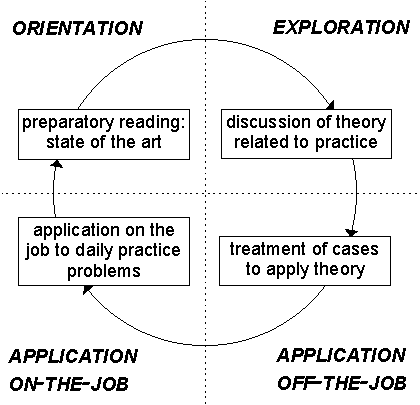
|
:::::::::::::::::::: |
The proposal for a European project for archival training: Dutch innovation in records education and trainingThijs Laeven
|
Traditional role |
Future role |
|---|---|
|
|
|
|
|
|
|
|
|
|
|
|
The five day seminar cycle supports this migration to a new role by the transfer of expertise. This required the development of a rather new pedagogical concept.
:: RETURN TO TOP :: :::::::::::::::::::::::::::::::::::::::::::::::::::::::::::::::::::
The pedagogical concept
The leading elements in this concept were as follows:
- Dual learning: there should be a continuous movement from “theory” to “practice” and back.
- Active learning: all of the material should be designed to enable students to formulate and analyze the problems they face or expect to face in their organizations and to work out solutions and to contribute to designing and implementing a policy for electronic records management.
- Experience-based learning: students are challenged to bring their experiences (successes and failures) and to learn how to exploit them as learning moments. These individual experiences will be enriched by treatment within the student group and by the experiences of the workshop leader and of the ‘best practices’ in the case studies.
- Anticipation learning: the course material should facilitate learning by anticipation in preparing students to read texts that are not designed for use in training circumstances. This can be done by introducing the text, highlighting the main points, and by giving steering or control questions.
- Network learning: the students are invited to use intranet or internet facilities to communicate with each other and with the seminar leaders and to find interesting material from all over the world.
- Collegial learning: the seminar cycle should stimulate collegial learning. It is not designed to transfer all of the required competences. On the contrary, it should bring about readiness to transfer expertise between colleagues and awareness to learn from others who might also learn from you.
:: RETURN TO TOP :: :::::::::::::::::::::::::::::::::::::::::::::::::::::::::::::::::::
The cycle of learning
In fact, this is the major design principle for the seminar cycle. Each of the five days presents a learning cycle in itself which consists of four phases:
- Orientation: preparation by reading state-of-the-art literature which is embedded in a pedagogical context.
- Exploration: adding experiences to the “theoretical” insights that result from the reading of the preceding phase.
- Application off-the-job: application to well designed cases in a “secure” context during the seminar days.
- Application on-the-job: application in daily practice and transferring new ideas and concepts to the employing organisation.
This learning cycle is illustrated in the following graph:

:: RETURN TO TOP :: :::::::::::::::::::::::::::::::::::::::::::::::::::::::::::::::::::
Students’ reactions and evaluation
The seminar cycle has run five times since the fall of 1997, and new cycles are scheduled for the coming months. Nearly 100 students have followed the course. Recently, we evaluated the course and collected students’ and teachers’ reactions and suggestions. Although some adaptations have proved necessary since 1997 they have not affected the basic principles. Adaptations mainly concerned the replacement of learning materials by actual versions of texts and legislation.
The students and the seminar leaders are very positive about the design and the pedagogical principles that underlie the material they have worked with: the seminars are very well structured. Criticisms deal with the relationship between the seminar cycle and the daily work practices of students. Too few students complete their practical tasks successfully. The seminar cycle is quite far ahead of developments in employing organisations, which limits the opportunities for transfer of learning. The students are ready to propose a new policy for electronic records management, but the organisations are not ready to implement it. In future, effective learning in the ‘application off-the-job’ phase will be stressed by developing two new cases which will be used as a common thread through each of the five seminar days. Of course the seminar cycle should not only affect the students, but should, crucially, influence their organisations. So application on-the-job remains an important objective. One could start to use a kind of “learning agreement” in order to stimulate organisations both to send staff to the course and to accept changes, and so offer a rich context for the transfer of learning. At the intake of new students such an agreement should make clear to all parties the common objectives of the individual student and of the organisation in which she or he is employed. These objectives must stress opportunities for the transfer of learning. This probably implies more restricted admission to the course but it should reduce frustration.
Further innovations of the seminar cycle could include such developments as distance learning.
:: RETURN TO TOP :: :::::::::::::::::::::::::::::::::::::::::::::::::::::::::::::::::::
Taking the project forward in a European context
In June 1997, a presentation of the Dutch seminar cycle, presented at an experts’ meeting held in the Hague, Netherlands, enthused colleagues from all over Europe.[1] We were invited to translate it into English. At the same time, an evaluation by Torbjörn KJÖLSTAD challenged us to investigate the possibility of incorporating the course into a distance learning system.[2] In time this led to a collaborative project, E-term, the European Training programme in Electronic Records Management for administrators and archivists, which is discussed in Elizabeth Shepherd’s complementary paper.
[1] European Experts’ meeting on electronic records: Proceedings 18 June 1997 (The Hague: Rijksarchiefdienst, 1997) Thijs Laeven, ‘Change of perspective — towards a new role for the records manager and the archivist’, 25–33
[2] European Experts’ meeting on electronic records: Proceedings 18 June 1997 (The Hague: Rijksarchiefdienst, 1997) ‘Evaluation of curricula’, 42–50
Extended abstract :: Full text :: Powerpoint show [80 Kb]
:: RETURN TO TOP :: :::::::::::::::::::::::::::::::::::::::::::::::::::::::::::::::::::
